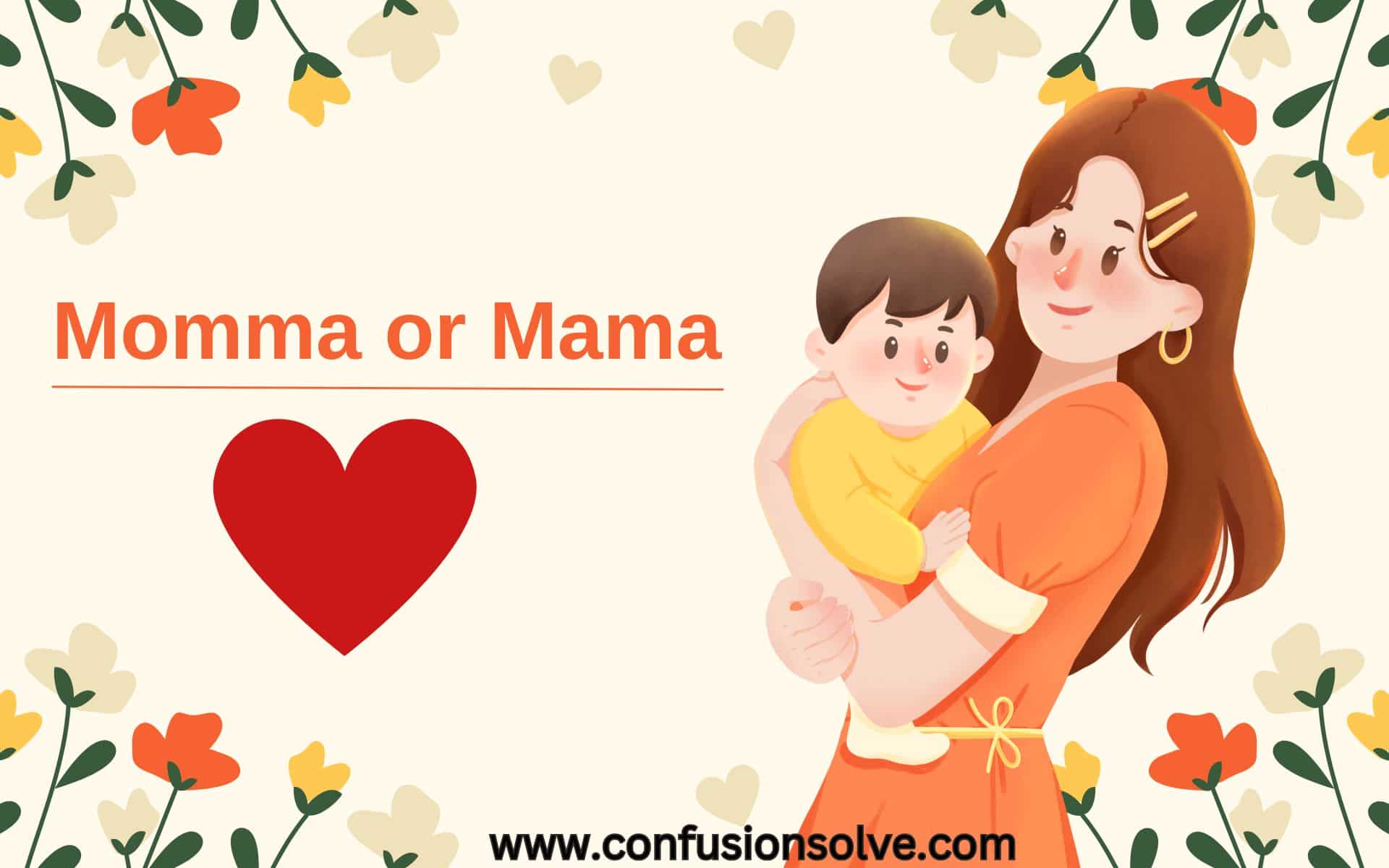Words have power, especially when they’re tied to the people we love most. “Momma” and “mama” are more than just ways to say “mother”—they’re expressions of love, warmth, and connection.
But which one is correct? Whether you’re writing a heartfelt letter, crafting a story, or simply chatting with family, the choice between “momma” and “mama” can shape the tone of your message.
From the cozy charm of Southern “momma” to the universal simplicity of “mama,” these terms carry cultural weight and emotional depth. In this guide, we’ll break down the differences, explore their origins, and help you choose the perfect word to honor the special women in your life. Let’s dive in!
Understanding the Difference Between Momma and Mama
Momma and mama are both informal terms for “mother,” but they have subtle differences. Momma is often seen as more affectionate and is commonly used in the Southern U.S. It has a warm, homey feel that many associate with close family bonds. On the other hand, mama is a more universal term, used across the globe in various languages. It’s simple, straightforward, and widely accepted in both formal and informal writing.
The choice between momma and mama often comes down to personal preference or regional norms. For example, someone from Georgia might say, “I love you, momma,” while someone from New York might say, “Thanks, mama.” Both terms are correct, but they evoke slightly different emotions and cultural connections.
Correct Spelling and Grammar for Momma and Mama
When it comes to spelling, both momma and mama are correct. However, mama is the more standard spelling and is often preferred in formal writing. For example, in academic papers or professional communications, you’re more likely to see mama used. On the other hand, momma is considered more informal and is often used in creative writing or personal conversations.
A common mistake is using “mamma” with two “m’s.” While this spelling is sometimes seen, it’s less common in modern English. To avoid confusion, stick with momma or mama depending on the tone you want to convey. For instance, “My mama always knows best” sounds more universal, while “My momma makes the best pies” feels more personal and regional.
Regional Variations: Momma in the Southern U.S.
In the Southern U.S., momma is a term of endearment that reflects the region’s warmth and hospitality. It’s deeply rooted in Southern culture and often appears in literature, music, and everyday conversations. For example, in Harper Lee’s To Kill a Mockingbird, the character Calpurnia is referred to as momma, highlighting her nurturing role in the family.
Outside the South, mama is more commonly used. This regional variation shows how language can reflect cultural identity. If you’re writing a story set in the South, using momma can add authenticity and emotional depth. For example, “Momma always said, ‘Kindness costs nothing,’” feels distinctly Southern.
Mama: A Universal Term for Mother
Mama is a term that transcends borders. It’s used in many languages, from Spanish (mamá) to French (maman) and even Swedish (mamma). This universality makes mama a versatile choice for writers and speakers. For example, in the U.S., you might hear, “Mama, can you help me with this?” while in Mexico, it’s “Mamá, ¿puedes ayudarme?”
The simplicity of mama makes it one of the first words babies learn. Its easy pronunciation (/ˈmɑː.mə/ or /ˈmæ.mə/) and emotional resonance have made it a global favorite. Whether you’re writing a personal letter or a formal essay, mama is a safe and widely understood choice.
Pronunciation of Momma and Mama
Both momma and mama are pronounced similarly, but there are slight differences. Momma is often pronounced as /ˈmɑː.mə/, with a longer “a” sound, while mama is usually pronounced as /ˈmæ.mə/, with a shorter “a” sound. These subtle differences can reflect regional accents. For example, in the South, you might hear a drawn-out “momma,” while in other regions, “mama” is more clipped.
Here’s a quick comparison:
| Term | Pronunciation | Region |
| Momma | /ˈmɑː.mə/ | Southern U.S. |
| Mama | /ˈmæ.mə/ | Global |
You may also like:Forrest or Forest – What’s the Difference?
Formal vs. Informal Usage of Momma and Mama
In formal writing, such as academic papers or professional emails, mama is generally the better choice. It’s more widely recognized and fits well in serious contexts. For example, “Her mama taught her the value of hard work” sounds appropriate in a formal essay.
In informal writing, like personal letters or storytelling, momma can add a touch of warmth and familiarity. For instance, “I miss you, momma” feels more intimate and heartfelt. The key is to match the term to the tone of your writing.
Cultural Significance of Momma and Mama
Both momma and mama hold deep cultural significance. In African American Vernacular English (AAVE), momma is often used to express respect and love for maternal figures. For example, “My momma raised me right” reflects pride and gratitude.
In immigrant families, mama is a way to preserve cultural identity. For instance, a Mexican-American family might use mamá to stay connected to their heritage. These terms aren’t just words—they’re expressions of love, tradition, and family values.
Momma and Mama in Songs, Movies, and Literature
Momma and mama have appeared in countless songs, movies, and books. For example, the Spice Girls’ hit song Mama celebrates the bond between mothers and daughters. In movies like The Color Purple, momma is used to convey deep emotional connections.
Here are some iconic examples:
- Songs: Mama by Spice Girls, Momma Said by Metallica.
- Movies: To Kill a Mockingbird, The Color Purple.
- Literature: Beloved by Toni Morrison, The Glass Castle by Jeannette Walls.
Etymology of Mama: Tracing Its Origins
The Latin Roots of “Mama”
- Explain how the word “mama” originates from the Latin word “mamma,” meaning “breast” or “mother’s breast.”
- Discuss its connection to nurturing and maternal care.
- Mention how this root influenced similar terms in other languages.
How “Mama” Evolved Across Languages
- Trace the journey of “mama” from ancient languages to modern English.
- Provide examples of similar words in other languages:
- Spanish: mamá
- French: maman
- Russian: мама (mama)
- Highlight how “mama” became a universal term for mother.
Why “Mama” is a Baby’s First Word
- Discuss the phonetic simplicity of “mama” (repetition of the “ma” sound).
- Explain why it’s one of the easiest sounds for babies to produce.
- Share scientific insights on why “mama” is often a child’s first word.
You may also like:Onsite or On-Site: Which One Should You Use?
Momma as an Affectionate Term for Mother
Why “Momma” Feels More Personal
- Explore the emotional weight of “momma” and its intimate, familial connotations.
- Discuss how it conveys warmth, closeness, and affection.
- Compare it to other terms like “mom” or “mother.”
How “Momma” Reflects Close Family Bonds
- Explain its use in close-knit family settings, especially in the Southern U.S.
- Discuss how it symbolizes strong maternal relationships and traditions.
- Provide examples of how “momma” is used in family conversations.
Examples of “Momma” in Everyday Conversations
- Share relatable examples:
- “Momma, can you help me with this?”
- “I love you, momma.”
- “Momma always knows how to make me feel better.”
When to Use Momma in Writing
Creative Writing and Storytelling
- Explain how “momma” adds a personal, emotional touch to novels, poems, and personal essays.
- Provide examples from Southern literature or family-themed stories.
Informal Letters and Social Media
- Discuss its suitability for casual communication, such as personal letters, texts, or social media posts.
- Share examples:
- “Hey Momma, just wanted to check in!”
- “Momma, you’re the best!”
Examples of “Momma” in Writing
- Provide sentence examples:
- “Momma’s cooking always brings the family together.”
- “In her diary, she wrote, ‘Dear Momma, I miss you so much.’”
When to Use Mama in Writing
Formal Essays and Academic Writing
- Explain why “mama” is more appropriate in formal contexts due to its universal recognition.
- Discuss its use in academic papers, professional communications, or public speeches.
Global Communication and Cross-Cultural Writing
- Highlight how “mama” is understood across cultures, making it ideal for global audiences.
- Provide examples of its use in multicultural settings.
Examples of “Mama” in Writing
- Share sentence examples:
- “Mama always taught me to be kind.”
- “In many cultures, ‘mama’ is a term of endearment for mothers.”
Examples of Momma and Mama in Sentences
Everyday Conversations
- Provide examples:
- “Mama, can you help me with my homework?”
- “I love you, momma.”
Formal and Informal Writing
- Share examples:
- “My mama always said, ‘Hard work pays off.’”
- “Momma makes the best apple pie in town.”
You may also like:Roll Call vs. Role Call: A Clear Guide to Correct Usage
Momma vs. Mama: Regional Dialects Explained
Southern U.S. Dialects and “Momma”
- Discuss how “momma” is deeply rooted in Southern culture and dialects.
- Provide examples from Southern literature or media.
Northern U.S. Dialects and “Mama”
- Explain how “mama” is more commonly used in Northern states.
- Compare its usage to “mom” or “mommy.”
How Dialects Shape Language Preferences
- Analyze how geography and culture influence the choice between “momma” and “mama.”
The Emotional Tone of Momma and Mama
Warmth and Familiarity in “Momma”
- Discuss how “momma” conveys a cozy, affectionate tone.
- Explain why it feels more personal and intimate.
Simplicity and Universality in “Mama”
- Highlight how “mama” is straightforward and widely recognized.
- Discuss its global appeal and emotional neutrality.
How Tone Influences Word Choice
- Provide tips for choosing between “momma” and “mama” based on the desired emotional tone.
Momma and Mama in British vs. American English
“Mum” and “Mummy” in British English
- Compare these terms with “momma” and “mama.”
- Discuss their cultural significance in the UK.
Why Americans Prefer “Momma” and “Mama”
- Explain the cultural and linguistic reasons behind this preference.
How to Adapt Terms for Different Audiences
- Provide tips for writers targeting British vs. American audiences.
Related Terms: Mum, Mummy, and Mommy
“Mum” in British English
- Explain its usage and cultural significance.
“Mommy” as a Child-Friendly Term
- Discuss its use by young children and in parenting contexts.
How These Terms Compare to “Momma” and “Mama”
- Provide a quick comparison chart.
You may also like:Oversite vs. Oversight: Which is the Correct Spelling?
How to Choose Between Momma and Mama
Consider Your Audience
- Discuss the importance of regional and cultural context.
Match the Tone to Your Message
- Explain how to align word choice with emotional intent.
Practical Tips for Writers
- Provide actionable advice for choosing the right term.
Conclusion:
Choosing between “momma” and “mama” comes down to tone, context, and personal preference. “Mama” is simple, universal, and works well in most situations. “Momma” feels warm, affectionate, and is deeply tied to Southern charm. Both words celebrate the love and care of mothers everywhere.
Whether you’re writing a letter, telling a story, or just talking to family, pick the term that feels right for you. After all, it’s not about the spelling—it’s about the love behind the word. Happy writing!
FAQs
- Do you spell mama or momma?
Both are correct. “Mama” is more universal, while “momma” is informal and often used in the Southern U.S. - Is it baby mama or momma?
The correct term is “baby mama,” referring to the mother of one’s child in informal contexts. - Is it momma or mama bear?
It’s “mama bear,” a term used to describe a protective or fierce mother. - Who is called momma?
“Momma” is an affectionate term for a mother, often used in close-knit families or Southern U.S. culture.










